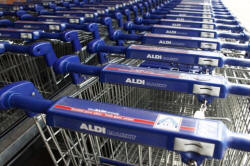|
Aldi will launch a pilot starting the end of this month in Los
Angeles, Atlanta and Dallas with the potential of expanding to
more cities in the future.
The German retailer does not offer customers an option to shop
on its own website now and the partnership is a way to test
online grocery demand, Aldi's Vice President of Corporate Buying
Scott Patton told Reuters.
"Grocery shopping online is a relatively small part of the
business but it is continuing to grow," Patton said.
A report from the Food Marketing Institute and market research
firm Nielsen in January this year estimated online grocery
spending during 2016-2025 to grow from 4.3 percent of the total
U.S. food and beverage sales to as much as 20 percent, or more
than $100 billion. Last year, online grocery sales were about
$20.5 billion.
Aldi's move also comes at a time when grocery chains in the
country are caught in a price war. German rival Lidl has started
opening stores in the country and online retailer Amazon.com Inc
<AMZN.O> said in June it will acquire grocery chain Whole Foods
Market Inc <WFM.N>.
To better position itself, Aldi said in June it would invest
$3.4 billion to expand its U.S. store base from more than 1,600
currently to 2,500 by 2022.
In May, Aldi Chief Executive Jason Hart told Reuters the chain
intended to have the lowest prices and would focus on adding
in-house brands to win over price-sensitive customers.
The partnership with Instacart will allow shoppers to order
goods from Aldi stores using Instacart's website and app.
Instacart, which charges a delivery fee, does not hold inventory
but picks up orders from the store and brings them to a
customer's home in as little as one hour. Other U.S. retailers
who have tied up with Instacart include Target Corp <TGT.N>,
Whole Foods Market Inc <WFM.N> and Costco Wholesale Corp <COST.N>.
(Reporting by Nandita Bose)
[© 2017 Thomson Reuters. All rights
reserved.] Copyright 2017 Reuters. All rights reserved. This material may not be published,
broadcast, rewritten or redistributed.
 |
|




